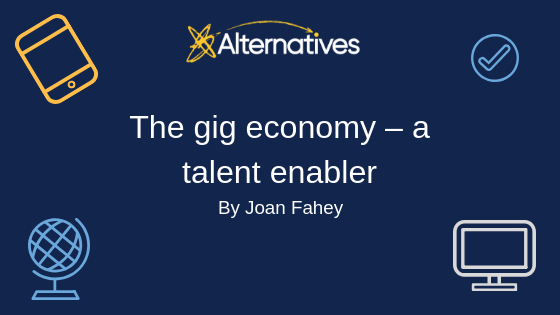By Joan Fahey, Head of Alternatives’ Flexible Panel, Alternatives
There’s much debate around the future of working but one trend that is definitely here to stay is flexible working. Flexible working, an alternative to the traditional nine to five job, covers a wide range of options, from remote working, part-time or job-sharing, to independent set-ups such as contracting or consultancy. All give professionals more flexibility and variety in their lives.
Global trends are staggering. Although flexible working has always been around, we are now in the midst of a real revolution. Organisations need to be prepared and revaluate their approach to attracting the best talent, as the nature of how we work and want to work is changing. The McKinsey Global Institute estimates that 162 million people – that’s 20%-30% of the working age population in the US and Europe-are engaged in some form of independent work or ‘alternative work arrangements’. In the UK alone, almost 5 million people work flexibly.
We have a new breadth of workforce who are starting to question how we should be working and it’s not just the millennials. Professionals at all life stages now see their careers very differently. They value life experiences more than being tied down to one organisation. They want to have more control and work on the things they really care about. They value results output rather than hours input. The world of technology of course has facilitated this.
Millennials specifically now make up more than half of the workforce and have very different work expectations. A Gallup study shows that by 2020 millennials will become the largest generation in the workforce and 72% want to be their own boss. They want flexibility, mobile work environments, variety in the work they do and the idea of spending their entire career with one employer is unthinkable; they will probably only spend 1-2 years with an organisation and move on.
And the Irish market is increasingly reflecting this. Although less prevalent than the US or UK for now, already some 200,000 people are employed in temporary or flexible arrangements and the numbers are rising. Our annual survey reveals that a significant 33% of respondents have contracted or freelanced before. In addition, flexible and remote working have now become one of the top priorities for candidates of all levels when looking for a new role. The preference of flexible working has also become more gender balanced, debunking the myth that it’s just mums that want to work more flexibly.
From an industry perspective, organisations are also more open to flexible working options as a means of retaining or accessing difficult to find talent and to remain agile. The Alternatives MII survey reveals 52% of respondents offer remote working options and 31% have flexible hours or part-time options with their current employer. 80% of companies in our survey are using flexible talent accessing interim employees, contractors and consultants across a range of industries which includes Utilities, Agri, Telco/ICT, Financial Services, Education, Professional/Business Services, Drinks and Agency sectors.
The most in demand ‘Flexible Talent’ skills within the marketing function are predominantly across strategy & planning, brand, innovation, digital and transformation, insights and customer experience, all critical to brand and business success today.
So what are the benefits? From a business perspective, using flexible talent can be a great solution to your team needs whether it’s specialist skills, fresh thinking, agility, cost savings or just business continuity you wish to gain. It provides quick access to fantastic talent without the lengthy full recruitment process often associated with permanent roles.
From a candidate perspective, it gives you the flexibility to live life on your terms, work on a variety of projects you love and ultimately get more freedom to live a more balanced life. It can also offer a way back in for those looking to go back to work or restart their careers.
The gig economy and flexible working is here to stay. To remain competitive, organisations need to embrace this new way of working to be able to attract and retain the best talent.
.png)